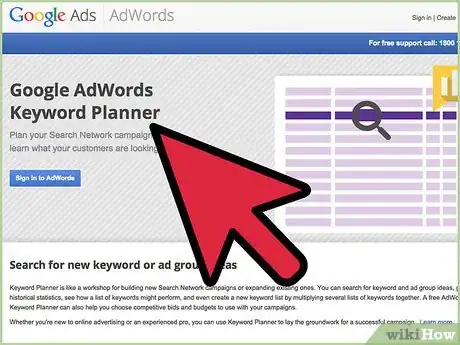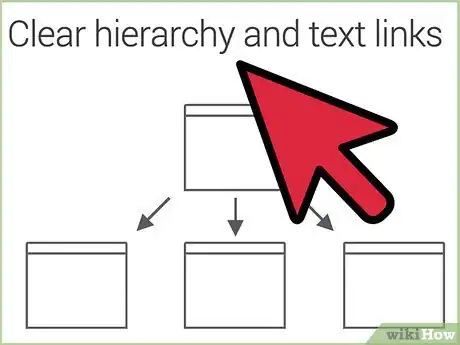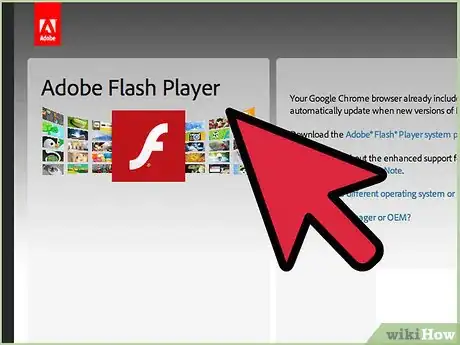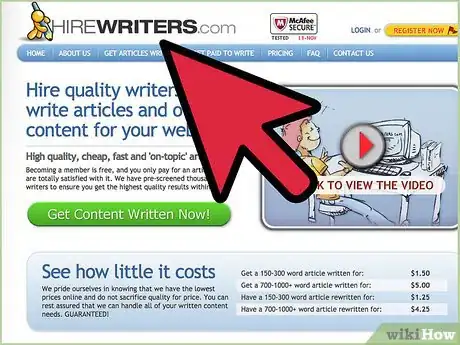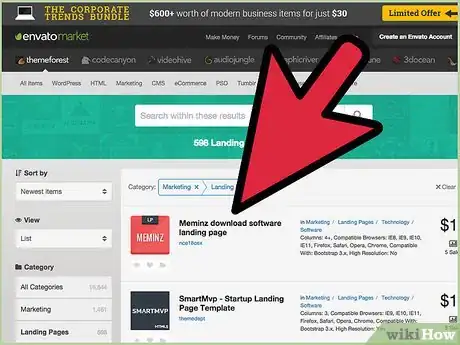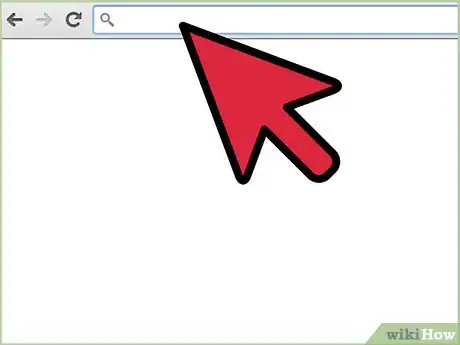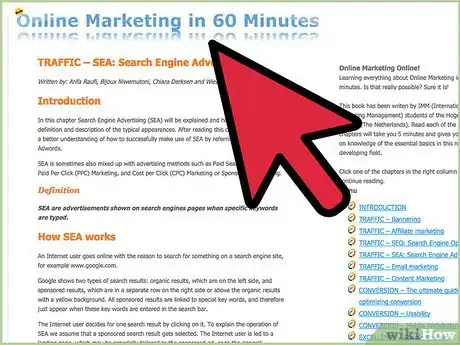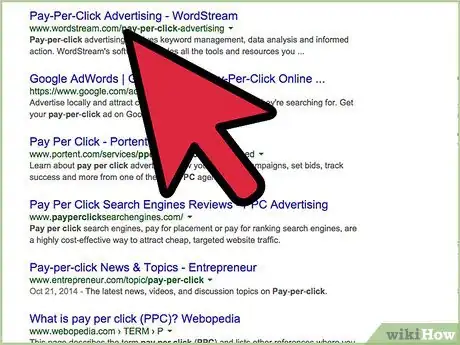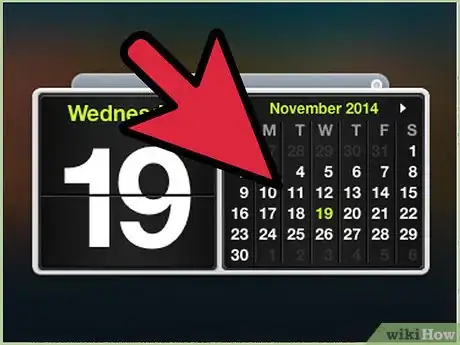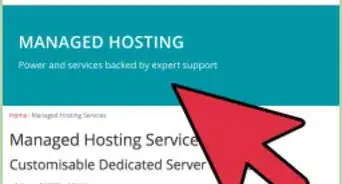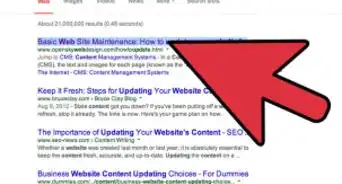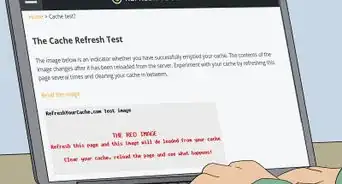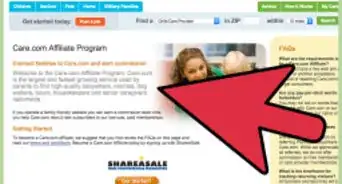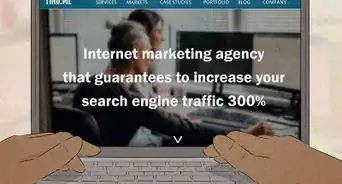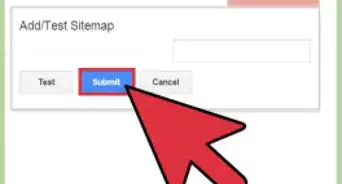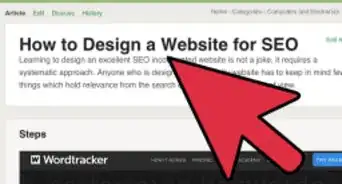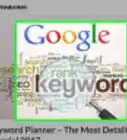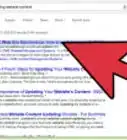This article was co-authored by Ryan Conway. Ryan Conway is a Marketing Expert and the Founder of Digital Tradesman, a digital marketing agency that helps builders, contractors, and tradesmen grow their business online. With over a decade of experience, he specializes in marketing, web design, and search engine optimization. Ryan holds a BS in Business Administration and Entrepreneurial Studies from Hartford University. He also studied Graphic and Web Design at the Boston University Center for Digital Imaging Arts. Ryan participated in Seth Godin’s altMBA in the winter of 2016.
This article has been viewed 41,376 times.
Search engine marketing recognizes that websites get a large amount of web traffic, approximately 30 percent, from Internet web searches. Search engines like Google, Yahoo, Bing and AOL create standards that serve as guidelines for developing search engine advertising. The 2 main ways of advertising using search engines are search engine optimization (SEO) and paid search advertising. SEO is the process of improving a website so that the content ranks highly on search engines. In paid search advertising, companies buy paid listings using chosen keywords. Most often the advertiser has a Pay-Per-Click (PPC) plan. Every time someone performs a query on a search engine, they will see both free, organic results and paid listings. Learning to use both types of advertising will increase traffic to your site. Learn how to use a search engine for advertising.
Steps
Search Engine Optimization
-
1Consider hiring a SEO firm or marketing professional. If you or people in your employ do not know much about how your website can be changed and structured, then it is important to hire someone to implement changes. Establish a budget for hiring a SEO professional.
-
2Do keyword research. Finding out which keywords are the most profitable and popular for your site will be useful for SEO and paid search advertising.
- Do some paid advertising for research. Set up Pay-Per-Click campaigns using your top keywords on Google AdWords and/or Microsoft adCenter. Determine the number of sales you achieve for your ad to get a percentage.
- With Google Ads, you can use the "Google Keyword Planner" to find keywords with a high search volume.[1]
- Analyze the profitability of your keywords by establishing the profit you get from the clicks you receive. Determine how many dollars you reap per 100 visitors. For example, if you receive 1000 clicks from a PPC campaign and you make a profit of $4000, then each click is worth $4.
Advertisement -
3Structure your website with a clear hierarchy. Each site should have at least 1 static text link. In order for a link to be popular and achieve high search engine ranking, it should be easy to find, remember and access.
-
4Avoid hiding your keywords inside rich media. While Ajax, Adobe Flash Player or JavaScript might improve the look of your website, the information in your site will be encrypted so that search engine crawlers cannot see it. Choose straight forward web design whenever possible.
-
5Use simple URLs that contain keywords. Each page of important content should contain at least 1 of your profitable keywords. Simplify your URLs before you post content to your site.
-
6Hire writers to create SEO content. Articles, videos, tutorials and other content should contain your profitable keywords in the URL, headline, first sentence and first paragraphs. This concentration will create a higher ranking on search engines.
-
7Use landing pages. Creating an attractive page for your content that addresses your customer's needs will increase your conversion rate. Landing pages can be set up to track important search engine data, so that you can evaluate them next to your general website homepage.
-
8Create high-quality content. Most search engines recommend that you invest in high-quality, customer oriented content. The more you encourage people to return to your website, the more popular the link is and the ranking will be higher on search engines.
-
9Change title and ALT attributes on content so that they are descriptive. These are the attributes that are often hidden from view, but they describe your website content to the search engines. Each piece of media should contain your lucrative keywords and be both descriptive and simple.
Paid Search Advertising
-
1Set up an infrastructure to set and track paid search advertising campaigns. It is difficult to set up a successful advertising campaign, if you don't already have a system for setting up Internet advertising campaigns. The following are things to ensure you have set up before paying for search engine advertisements:
- Choose a goal for your search engine advertising. Paid advertisements require that you choose keywords, so promoting specific content or products in a campaign is often more successful than trying to promote your business in general. Choose a single campaign to set up when you are just starting paid searches.
- Establish your budget. Consider labor, pay-per-click bids, tracking and the duration of the budget.
- Establish your baseline of search engine traffic. Spend 1 to 3 months tracking your search engine statistics without paid advertisements. Create a report, so that you can compare each campaign against your baseline traffic.
- Invest in tracking software. If your website infrastructure does not already include high-tech tracking software, you will not be able to determine if you have a successful campaign. Investing in installing tracking pages that tell you where your traffic comes from will allow you to save money on redundant marketing campaigns.
- Choose key performance indicators (KPI). These are factors that you use to judge the performance of an advertising campaign. They should be numbers, comments or sales that you can track through the course of the campaign.
-
2Experiment with each type of paid search advertisement. Try 1 of each type and track what is most successful for your website. The following are the most commonly used ways of paying for search engine advertising:
- Try paid placement listings. These sponsored listings may or may not be Pay-Per-Click. They are usually highlighted at the top, bottom or side of the search results. AOL, Google, Bing, Ask and many other search engines offer sponsored listings.
- Try a paid submission with Yahoo. You will need to develop a keyword-rich description of your website and pay to have it listed with Yahoo's directory.
- Try banner ads on search engines. Banner ads are used all over the Internet, but they can also appear on the top, bottom and sides of a search results screen when people search for your keywords. It should be a well designed graphic that has proven results with attracting people to your page.
- Try content promotion. If you are looking to advertise a specific piece of high-quality content, you can pay to have it listed as sponsored content. AOL, Ask and Yahoo use sponsored content schemes.
-
3Check your campaign twice or more per week. You should assign someone to track the progress of your campaign and to develop data with it. Do not let a campaign go for more than a month before evaluating whether it is giving you results.
-
4Refine your paid search engine advertisements. Remove any campaigns that have not been successful and evaluate them for future reference. Stick with types of advertisements that show profitable results.
-
5Develop a procedure for advertising new or important content on search engines. Many of your classic keywords and brand name focused paid advertisements will stay up for a long period of time; however, you should also develop a system for promotion via search engines. Make it part of your marketing plan.
Community Q&A
-
QuestionHow do I choose keywords for SEM?
 Ross TaylorRoss Taylor is a Marketing Expert and the Founder of Alameda Internet Marketing. With over 10 years of experience, Ross specializes in Search Engine Optimization (SEO) and Search Engine Marketing (SEM). Ross’ boutique SEO agency is a Google Partner agency, which has been recognized for its dedication to honest communication and quality service with awards from UpCity, ThreeBestRated.com, and Clutch. Ross holds an Associate of Arts degree from Chabot College and certifications in Google AdWords and CompTIA A+.
Ross TaylorRoss Taylor is a Marketing Expert and the Founder of Alameda Internet Marketing. With over 10 years of experience, Ross specializes in Search Engine Optimization (SEO) and Search Engine Marketing (SEM). Ross’ boutique SEO agency is a Google Partner agency, which has been recognized for its dedication to honest communication and quality service with awards from UpCity, ThreeBestRated.com, and Clutch. Ross holds an Associate of Arts degree from Chabot College and certifications in Google AdWords and CompTIA A+.
Marketing Expert A good way to go about doing this is looking at the auto-suggest features on Google. You can find this feature by typing in a question or something in the search panel and seeing the different autocomplete results. Those are going to be things that other people are searching for, which is a good signal that they're highly-searched keywords. You can also research good keywords using the planning tool on Google Ads.
A good way to go about doing this is looking at the auto-suggest features on Google. You can find this feature by typing in a question or something in the search panel and seeing the different autocomplete results. Those are going to be things that other people are searching for, which is a good signal that they're highly-searched keywords. You can also research good keywords using the planning tool on Google Ads. -
QuestionHow do I optimize my website for search engines?
 Ryan ConwayRyan Conway is a Marketing Expert and the Founder of Digital Tradesman, a digital marketing agency that helps builders, contractors, and tradesmen grow their business online. With over a decade of experience, he specializes in marketing, web design, and search engine optimization. Ryan holds a BS in Business Administration and Entrepreneurial Studies from Hartford University. He also studied Graphic and Web Design at the Boston University Center for Digital Imaging Arts. Ryan participated in Seth Godin’s altMBA in the winter of 2016.
Ryan ConwayRyan Conway is a Marketing Expert and the Founder of Digital Tradesman, a digital marketing agency that helps builders, contractors, and tradesmen grow their business online. With over a decade of experience, he specializes in marketing, web design, and search engine optimization. Ryan holds a BS in Business Administration and Entrepreneurial Studies from Hartford University. He also studied Graphic and Web Design at the Boston University Center for Digital Imaging Arts. Ryan participated in Seth Godin’s altMBA in the winter of 2016.
Marketing Expert Include keywords in your page title, URL, and meta description. The meta description doesn't appear on the webpage itself; instead, it's something you put on the back end of the site.
Include keywords in your page title, URL, and meta description. The meta description doesn't appear on the webpage itself; instead, it's something you put on the back end of the site. -
QuestionWhy are long-tail keywords important for SEO?
 Ryan ConwayRyan Conway is a Marketing Expert and the Founder of Digital Tradesman, a digital marketing agency that helps builders, contractors, and tradesmen grow their business online. With over a decade of experience, he specializes in marketing, web design, and search engine optimization. Ryan holds a BS in Business Administration and Entrepreneurial Studies from Hartford University. He also studied Graphic and Web Design at the Boston University Center for Digital Imaging Arts. Ryan participated in Seth Godin’s altMBA in the winter of 2016.
Ryan ConwayRyan Conway is a Marketing Expert and the Founder of Digital Tradesman, a digital marketing agency that helps builders, contractors, and tradesmen grow their business online. With over a decade of experience, he specializes in marketing, web design, and search engine optimization. Ryan holds a BS in Business Administration and Entrepreneurial Studies from Hartford University. He also studied Graphic and Web Design at the Boston University Center for Digital Imaging Arts. Ryan participated in Seth Godin’s altMBA in the winter of 2016.
Marketing Expert The phrases people search on Google are becoming more and more specific, which makes long-tail keywords really important.
The phrases people search on Google are becoming more and more specific, which makes long-tail keywords really important.
Things You'll Need
- SEO consultant/firm
- High quality content
- Landing pages
- Keywords
- Clear website hierarchy
- Simple URLs
- Campaign tracking
- Key performance indicators
- Paid submissions/placements
- Banner ads
- Sponsored content
- Search engine marketing plan
References
- ↑ Ross Taylor. Marketing Expert. Expert Interview. 4 May 2021.
- http://searchenginewatch.com/article/2067476/Buying-Your-Way-In-Search-Engine-Advertising-Chart
- http://searchengineland.com/guide/what-is-sem
- http://www.toprankblog.com/2008/08/piad-search-advertising-101/

